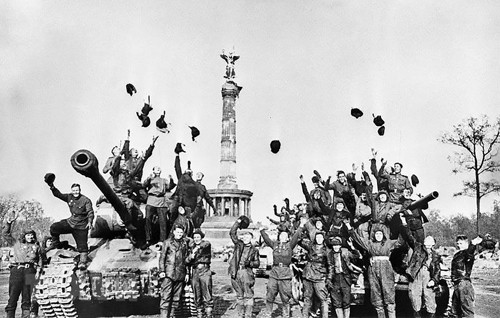(VOVWORLD) - On May 9, 1945, several days after the Italian fascists were defeated by the Allies, Germany’s fascists also surrendered. That event marked the complete collapse of fascism in Europe and led to the surrender of the Japanese fascists on September 2, ending World War II. With the Rome–Berlin–Tokyo Axis defeated, dozens of countries were liberated and hundreds of millions of people were saved. May 9 is annually observed as Victory Day in many countries.

Soviet soldiers cheer their victory in Berlin, the last stronghold of German fascists in World War II, May 9, 1945 (Photo: VNA archives)
|
75 years have elapsed but the victory of allied forces over fascism still provides relevant lessons about the mission of peace safeguarding.
Historical lessons from World War II
There’s a widely-accepted truth that World War II stemmed from unsettled conflicts between imperialist countries. At a disadvantage in colonies and markets, emerging imperialist powers: Germany, Japan, and Italy formed a fascist axis and built up their armies into an “invasion machine” to wage a war to re-divide the world.
A military alliance led by the Soviet Union, the United States, and the United Kingdom was established to counter the fascists. At the Yalta Summit initiated by the Soviet Union in February, 1945, the three powers agreed to share the task of rooting out fascism and militarism, set up an organization to safeguard world peace and security, and negotiate a division of power between the Soviet Union and the United States. In 1946, one year after World War II ended, the United Nations Security Council was established to undertake the mission of maintaining and protecting world peace.
Despite stark differences in ideology, political structure, and interests, the three world powers aligned to fight fascism, the common enemy of humankind. Now that world order is changing drastically with the emergence of severe threats to world peace and human existence, the lessons of World War II are being recalled.
Protecting world peace still the primary mission
At a forum to honor victims of genocidal crimes in Israel-controlled Jerusalem early this year, Russian President Vladimir Putin recommended a summit of the heads of state of the 5 permanent members of the UN Security Council to address global peace and security threats. Analysts dubbed the idea “Yalta Summit Initiative 2”, implying the summit would rival in importance the Yalta Summit at the end of World War II.
In a statement delivered on January 22 to the UN General Assembly on the Secretary-General's priorities for 2020, UN chief António Guterres pointed out “four looming threats that endanger 21st-century progress and imperil 21st-century possibilities.” They are geopolitical tensions, the climate crisis, global mistrust, and the downsizing of technology.
Analysts are most concerned about the first threat: geopolitical tensions and the nuclear menace. Since late 1990s, the US, the UK, France, Russia, and China, the 5 permanent members of the UN Security Council, have no longer been the only countries that possess nuclear weapons. In 2002, the US unilaterally withdrew from the landmark Anti-Ballistic Missile (ABM) Treaty signed in 1972 with Russia and pushed for the deployment of a new missile defense shield in Europe and East Asia. Last year, Washington pulled out of the 1987 Intermediate-Range Nuclear Forces (INF) Treaty with Russia and refused to negotiate with Moscow an extension of the third-phase Strategic Arms Reduction Treaty (START III) due to expire in 2021.
Analysts emphasized the need to organize a special meeting like the 1945 Yalta Summit to find ways to prevent a nuclear arms race, which they said is more dangerous to world peace than fascism. One lesson drawn from the last world war is that countries need to put aside their differences and work together to ensure a world that is safe and peaceful.